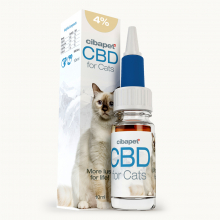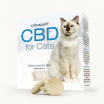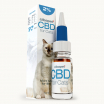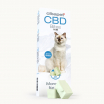Is CBD Good for Older Cats?
Published:
As cats age, their bodies change. Joints can become stiff and painful, appetite may decline, and behavior and activity levels often shift as well. As a cat owner, it's natural to look for ways to help your aging feline companion feel as comfortable and content as possible.
Contents:
- What is CBD?
- Why Would CBD Help Older Cats?
- Is CBD Safe for Cats?
- What Symptoms Could CBD Help With in Older Cats?
- What’s the Best Way to Give CBD to Cats?
- Are There Any Potential Side Effects of CBD for Cats?
- Key Takeaways on CBD for Senior Cats
- Is CBD safe for older cats?
- What conditions might CBD help with in older cats?
- How could CBD help with arthritis in older cats?
- What’s the best way to administer CBD to cats?
- How long does it take for CBD to work in cats?
- Can CBD cause any side effects in cats?
- Should I tell my vet if I give my cat CBD?
- What should I look for when buying CBD for cats?
- How much CBD should I give my older cat?
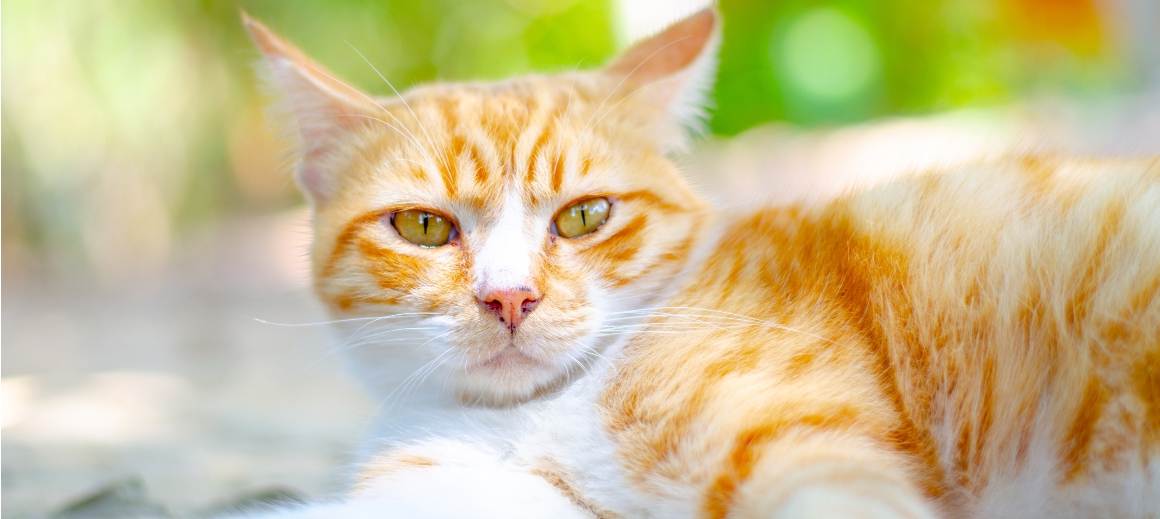
In recent years, CBD oil has grown in popularity for both human and pet use. But is CBD truly safe and effective for senior cats? Let's take a closer look.
What is CBD?
CBD stands for cannabidiol, which is one of over 100 active compounds found in the cannabis plant. Unlike the compound THC, CBD is not psychoactive. This means it does not produce any mind-altering effects.
CBD works by interacting with the body's endocannabinoid system, which helps regulate various physiological processes like pain, mood, sleep, and inflammation. When introduced into the body, CBD can influence the activity of endocannabinoid receptors and help the body maintain balance.
So in summary:
- CBD is derived from cannabis but is non-psychoactive.
- It works by interacting with the body's endocannabinoid system.
- CBD may help regulate pain, mood, sleep, appetite, and more.
Now that we understand what CBD is, let's look at why cat owners may consider using it for their senior felines.
Why Would CBD Help Older Cats?
As cats reach their senior years, between 11-15 years old, a variety of changes occur. Most cats begin to slow down, sleep more, gain weight, and experience some decline in vision or hearing. More significantly, arthritis becomes common as cartilage and joints degrade. This causes stiffness, difficulty jumping or navigating stairs, and chronic pain.
Senior cats may also experience gastrointestinal issues, altered behavior, cognitive decline, and an array of other age-related health problems. Chronic inflammation and oxidative damage are believed to be at the root of many of these issues.
So how could CBD potentially help? A few key ways:
Pain relief - CBD has been shown to have painkilling effects by interacting with endocannabinoid receptors involved in pain modulation. For senior cats suffering from arthritis or other pain, CBD may provide relief and improved mobility.
Anti-inflammatory - By lowering inflammation throughout the body, CBD may alleviate joint stiffness, improve gut health, and support the immune system. Less inflammation means less pain too.
Anti-anxiety - CBD appears to modulate serotonin and other neurotransmitters in the brain. This can create a calming effect that helps anxious cats relax.
Appetite stimulant - CBD may act on CB1 receptors to stimulate appetite. This could help underweight senior cats regain interest in food.
Anti-nausea - Evidence shows CBD can help reduce nausea and vomiting. It may ease digestion in older cats with more sensitive stomachs.
Neuroprotective - CBD seems to act as an antioxidant in the brain, helping curb damage from stress and aging. This may delay cognitive decline in senior cats.
So in multiple ways, CBD could potentially improve quality of life for aging cats. But more research is still needed to fully understand CBD's mechanisms and effects.
Is CBD Safe for Cats?
While anecdotal evidence of CBD benefiting cats continues to grow, scientific research is still in the early stages. Most evidence for CBD's effectiveness comes from lab studies on rodents, along with human clinical trials.
Rigorous research on CBD and pets is limited, but some initial studies have shown promise. For example, one study gave arthritic dogs CBD oil for 4 weeks. The dogs showed significant improvement in pain levels, mobility, and activity with no side effects.
Another study explored CBD for cats with arthritis. After receiving CBD for 4 weeks, over 80% of cats had decreased symptoms with no side effects reported.
So current research indicates CBD is likely safe and well-tolerated by cats, with minimal risk of side effects. However, there are a few precautions to keep in mind:
- Only use high-quality CBD formulated for pets. Avoid human CBD products.
- Consult your vet first, especially if your cat takes medication. CBD can interact with some drugs.
- Start with low doses and monitor your cat's reaction. Increase slowly if needed.
- Look for organic CBD free of pesticides, solvents, and additives.
- Check the THC content. THC is toxic for cats - CBD products should contain 0.3% or less.
While more studies are needed, CBD appears relatively safe for cats if used responsibly under veterinary supervision. But always exercise caution when trying new supplements with your pet.
What Symptoms Could CBD Help With in Older Cats?
Now that we've covered the basics of CBD and its safety profile for cats, let's look at some of the specific symptoms and conditions CBD could potentially help senior cats manage.
Arthritis - CBD is perhaps most promising for feline arthritis and joint pain. By reducing inflammation, relaxing muscles, and dulling pain signals, CBD may improve mobility and activity levels.
Appetite Loss - CBD may help stimulate appetite by interacting with CB1 receptors involved in hunger. This could help underweight senior cats regain interest in food.
Nausea - By reducing nausea and vomiting, CBD may ease digestive issues in older cats with sensitive stomachs.
Cognitive Decline - CBD appears to have neuroprotective antioxidant effects in the brain which could help delay cognitive impairment in aging cats.
Anxiety - For senior cats who develop anxiety from cognitive decline, isolation, or other stressors, CBD may provide a calming effect without sedation.
Sleep Issues - Evidence shows CBD can boost nighttime REM sleep. This could benefit senior cats who tend to wake frequently or struggle to sleep through the night.
Chronic Pain - For pain unrelated to arthritis, like bone cancer or postoperative pain, CBD may offer alternative relief from standard medications.
Inflammatory Bowel Disease - By reducing gut inflammation, CBD may potentially aid cats with IBD or similar digestive issues.
So while more research is needed, CBD shows promise for multiple age-related symptoms in senior cats. Always chat with your vet before trying CBD to ensure safety and proper dosing.
What’s the Best Way to Give CBD to Cats?
CBD is available in various forms, but the most common for pets are oils and treats/chews. Oils offer the most flexibility for dosing, while treats provide a consistent measured dose.
Here are some tips for giving your senior cat CBD:
- CBD oil - Administer directly into the mouth or mix with wet food. Pick a high-quality oil made for pets. Monitor dosage carefully.
- CBD treats - Easier to dose consistently, but cat may resist if picky. Choose soft chews to reduce chewing needed.
- Start low, go slow - Begin with the lowest dose recommended for your cat's weight and gradually increase every 1-2 weeks if needed.
- Consistency is key - Give CBD at the same times each day to maintain stable levels in your cat's system.
- Avoid feeding close to medications - Separate CBD and prescription meds by at least an hour to avoid possible interactions.
- Have patience - It can take 4+ weeks for the full effects of CBD to be observable as it builds up in your cat's body.
Be patient and committed to see the best results from CBD for your senior cat. Consult your vet for specific dosing guidance.
Are There Any Potential Side Effects of CBD for Cats?
Current research indicates CBD appears quite safe for cats, with a low risk of side effects. However, some potential adverse reactions are possible:
- Dry mouth - CBD can inhibit saliva production. Ensure fresh water is always available.
- Drowsiness - High CBD doses may cause mild sedation. Lower the dose if your cat seems overly sleepy.
- Upset stomach - CBD may cause nausea, vomiting or diarrhea if the dose is too high. Reduce the dosage if these occur.
- Changes in liver enzymes - High doses of CBD could impact liver function. Have your vet run periodic bloodwork to monitor enzyme levels.
- Interactions with medications - CBD can alter how other drugs metabolize. Use caution, consult your vet, and space out CBD and other medications.
Adverse effects appear relatively rare if CBD is used properly. But as with any supplement, it's important to monitor your cat for any reactions. Discontinue use if negative side effects occur.
Key Takeaways on CBD for Senior Cats
CBD holds promise for supporting healthy aging in cats by potentially easing pain, reducing inflammation, alleviating anxiety, stimulating appetite, and more. Key points to remember:
- Consult your vet before trying CBD and have them guide proper dosing.
- Pick a high quality CBD product formulated specifically for pets. Avoid human CBD oils.
- Administer CBD consistently, gradually increase dosage if needed, and monitor for side effects.
- Use caution if combining CBD with prescription medications due to possible interactions.
- Allow 4+ weeks to observe the full effects as CBD builds up in the body over time.
- More studies are still needed, but existing research indicates CBD appears fairly safe for cats under proper veterinary care.
While not definitive, current evidence suggests CBD may improve quality of life for senior cats struggling with chronic pain, appetite issues, anxiety, nausea, cognitive decline, and other age-related conditions. Under veterinary supervision and used responsibly, CBD is worth considering for optimizing health and comfort in aging cats.
Is CBD safe for older cats?
While research is still limited, current evidence suggests CBD is likely safe for senior cats when used responsibly under veterinary supervision. CBD appears well-tolerated by cats with a low risk of side effects. However, it's important to choose high-quality products formulated specifically for pets and follow proper dosing guidelines. Consult your vet before using CBD with any pet.
What conditions might CBD help with in older cats?
CBD may potentially help senior cats manage pain, inflammation, digestive issues, anxiety, cognitive decline, appetite problems, sleep disorders, and other age-related health conditions. By interacting with the body's endocannabinoid system, CBD can influence pain, mood, appetite, nausea, and more. More research is still needed.
How could CBD help with arthritis in older cats?
CBD may relieve arthritis and joint pain in senior cats through several mechanisms. It can reduce inflammation affecting the joints, act as a painkiller by dulling pain signals to the brain, and relax stiff, tense muscles around painful joints. This may improve mobility and activity levels.
What’s the best way to administer CBD to cats?
The most common CBD products for pets are oils and treats/chews. Oils allow for more precise dosing but can be trickier to administer. Treats provide consistent dosing but may be resisted by picky cats. It’s best to start with the lowest recommended dose and increase gradually as needed.
How long does it take for CBD to work in cats?
It can take 4 weeks or more for the full effects of CBD to become apparent. This is because CBD builds up in the body over time. It needs to reach optimal levels through consistent daily dosing before maximum benefits are observed. Have patience when first starting CBD.
Can CBD cause any side effects in cats?
CBD is generally well-tolerated but mild side effects are possible, including dry mouth, diarrhea, vomiting, drowsiness, and changes in liver enzymes. Reduce dosage or discontinue CBD if any adverse reactions occur. CBD can also interact with some medications, so consult your vet.
Should I tell my vet if I give my cat CBD?
Always inform your vet if you give your cat CBD or any other supplement. Vets can provide dosing guidance, monitor for side effects, and watch for potential interactions with medications or health conditions. Open communication with your vet is key.
What should I look for when buying CBD for cats?
Only use CBD formulated specifically for pets, not human products. Look for organic, high-quality CBD free of pesticides, solvents, additives, and artificial ingredients. Confirm the THC content is 0.3% or lower. Buy from reputable brands that provide third-party testing results.
How much CBD should I give my older cat?
There is no standardized CBD dosage for cats. Dosing depends on the product, the cat's weight, and the condition being treated. Follow package directions and start low. Your vet can provide specific dosing recommendations tailored to your cat and their health needs.









